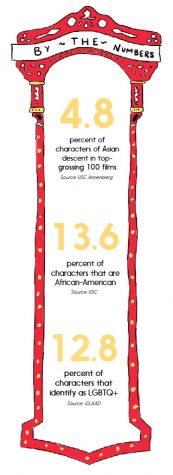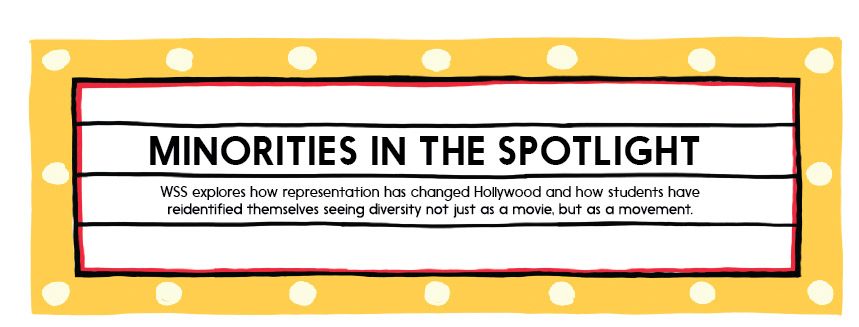Your donation will support the student journalists of West High School. Your contribution will allow us to purchase Scholarship Yearbooks, newsroom equipment and cover our annual website hosting costs.
Minorities in the spotlight
WSS explores how representation in 2018 has changed Hollywood and how students have re-identified themselves seeing diversity not just as a movie, but as a movement.
December 14, 2018
ICrazy Rich Asians
t has been more than 25 years since an all-Asian cast was seen in Hollywood, last seen in “The Joy Luck Club.” Since then, in 2017, only 4.8 percent of all characters in the year’s top-grossing 100 films were of Asian descent according to USC Annenberg. However, the 2018 release of “Crazy Rich Asians” starring another historic all-Asian cast, is changing that precedent.
Becoming the most successful studio rom-com in more than nine years according to CBS, it is not only changing the way Hollywood sees Asian-Americans, but also the way that the Asian-American community views themselves.
“It was almost surreal to see a movie like ‘Crazy Rich Asians’ being made because I had never really seen people that looked like me in mainstream media,” Chen said. “Watching this movie just gave me thrills and was really profound. I was really proud.”
The sense of pride stems from a situation where often, roles for Asians in past mainstream media have been stereotyped to represent Asians in a narrow perspective, affecting the general perception of the minority group.
“I would say there’s two archetypes of the Asian character – one is the nerd or smart one, maybe a Harvard graduate. The second one is like the karate martial arts master,” Chen said. “Seeing any of us in any kind of role that’s different is I think, very meaningful.”
There is also a certain expectation of the stereotypes that mainstream media likes to portray, and the idea that Asians pursuing dreams, like acting, are not encouraged or supported.
“Especially for children of first generation immigrants from Asia, I would say that their parents want their kids to be in more stable jobs, because acting or anything in the arts isn’t seen as stable. And since they’re first generation, they know how much it means to be able to make a living – to build something from nothing,” Chen said.
However, for Asians who do pursue a profession in acting, lead roles are even more limited due to a past of Hollywood whitewashing Asian characters. One controversy involved actress Scarlett Johansson, who portrayed a Japanese antagonist in the film, “Ghost in the Shell.”
“[Johansson] honestly speaks to so many levels of entitlement and white privilege [by] the fact that she doesn’t see it as a problem that she’s taking away a platform,” Emily Buck ’19 said. “That fact that she can feel entitled to tell that story just tells me how lacking Hollywood has in understanding what it means to be underrepresented.”
However, that situation may be changing.“Crazy Rich Asians” has inspired many, creating a wave of discussion in Asian-American issues and representation. Films such as “To All the Boys I’ve Loved Before” and the live-action “Mulan” have many hopeful about the role Asians have in shaping Hollywood’s future.
“I feel like [representation] has been a long time coming. It honestly should have happened sooner, but I’m glad it played out and an all-Asian cast is just so incredibly special,” Buck said. “If anything, it proves that diversity sells.”
Chen agrees, and encourages Asians to use the movement to break stereotypical boundaries and pursue their goals.
“I think we sort of have to have a little bit of courage,” Chen said. “It can be an unconventional path, but you never know where it might take you.”
Black Panther
Marvel Studios came out with its first nearly all-black casted movie, “Black Panther.” Within the first two release weeks, it had already crossed the $700 million mark, becoming the second-highest opening in box office history.
The movie release comes after a long history of white representation at the Oscars, inspiring the #OscarsSoWhite social media campaign which forced Hollywood to revisit the issue of representation on-screen. According to research from the University of Southern California, African Americans represented only 13.6 percent of characters in major film projects compared to 70.8 percent of white characters in 2017. African American directors were also represented at just 5.6 percent.
Peyton Freeney ’19, an aspiring film director and Film Club leader, believes that “Black Panther” has changed that pattern.
Becoming the top-grossing film of all time directed by an African-American director, it has inspired Freeney in making his dreams a reality.
“I want to tell stories about my experiences being an African-American and I want others to feel that they can express their creativity and that their story needs to be told,” Freeney said. “I would watch interviews about [Black Panther] and just learn about how people behind the screen were African-American and it inspired me personally that I could create something that monumental.”
Despite Hollywood limitations, Freeney believes that setbacks are what make movies like “Black Panther” more influential.
“There’s this certain perception that minorities won’t do as well in the box office but they end up doing just as well,” Freeney said. “They are even more impactful and inspiring.”
However, throughout working many film projects during his career, Freeny has faced personal struggles along the way.
“Just trying to learn how to do [projects] by yourself is already so hard and I’ve attempted to create so many things that haven’t caught on to the plans in my mind. You dream and think so big that sometimes in reality it doesn’t turn out how you wanted,” Freeney said. “I’ve definitely gotten to low points where I asked myself, ‘Why am I still doing this?’ I almost give up. But I think that kind of pushes me more.”
In overcoming those barriers, Freeney believes that people shouldn’t just wait for opportunities.
“I think we have to reach out and do whatever it takes,” he said. “Even when I struggle and face barriers, successes like ‘Black Panther’ drive me even more.”
Love, Simon
LGBTQ+ lead roles have already been present in movies such as “Moonlight,” which has been awarded an Oscar for best picture.
However, the release of “Love Simon” is the first movie produced by a major Hollywood studio that showcases a gay teenage protagonist.
Within the first two opening box office weeks, the movie amassed over 32 million dollars and is the beginning of making LGBTQ+ characters more mainstream and understandable to the public.
“With LGBTQ kids, representation is incredibly important to see,” said Colors Club president Emily Buck ’19. “Society likes to imprint all of these models and expectations on building relationships and how to be with other people and what is deemed normal.”
According to the Gay, Lesbian and Straight Education Network (GLSEN), LGBTQ teens are 6 times more likely to experience symptoms of depression than the general population.
“When you don’t see LGBTQ relationships or LGBTQ people, a lot of LGBTQ kids feel isolated, they feel like they’re not normal. That’s really detrimental to their health because mental health is something the LGBTQ community struggles with a lot,” Buck said. “So I think this [Love Simon] representation is huge because it gives people all sorts of different models they can look at, point out and see, like ‘Oh that’s what I can be. That’s my potential. I see myself in these characters.’ And that’s invaluable.”
However, despite ‘Love Simon’ success, Hollywood has failed to portray LGBTQ characters broadly across the board.
An organization called GLAAD, founded by LGBTQ people in the media who released an annual study about LGBTQ representation called the “Studio Responsibility Index,” proves the trend.
Of the 109 film releases that GLAAD counted from major studios in 2017, only 12.8 percent contained any characters that identified as LGBTQ.
Nearly half of all films that GLAAD analyzed in 2016 found LGBTQ characters to have less than 1 minute of screentime. In its annual grade ranking of studios, no studio has ever received an ‘Excellent’ rating.
Many in the LGBTQ+ community hope that ‘Love Simon’ is the catalyst that helps to change the representation standards for LGBTQ+ in mainstream media and to give them a greater voice in the world.
“In a world where the majority rule, representation is so important because it makes sure that the minorities have a voice,” Buck said. “Democracy is all about doing what the majority wants so for [minorities], representation is a way to have a voice in the system, to have your story be told, and to make sure you feel like this is a place where you belong.”


